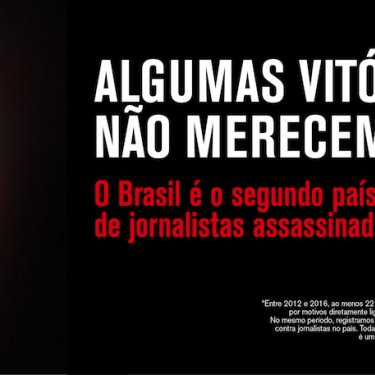“Some wins don’t deserve medals” - RSF’s Rio Olympics campaign

As the entire world turns its gaze on Rio de Janeiro for the 2016 Summer Olympics, Reporters Without Borders (RSF) is launching a campaign to draw attention to violence against journalists in Brazil. With at least 22 journalists killed in connection with their work since the last Olympics in 2012, Brazil is now Latin America’s second deadliest country for media personnel.
Produced jointly with Cheeeeese, an international branding agency, and called “Some wins don’t deserve medals” (Algumas vitórias não merecem medalhas), the campaign aims to make Brazilian society and the international community more aware of the dangers for journalists and to put pressure on the authorities to take concrete measures to protect them.
22
journalists have been killed in Brazil between 2012 and 2016
The staff of RSF’s Rio de Janeiro-based regional bureau will go to several Olympic sites during the games to help get the message across.
Since the 2012 Summer Olympics in London, 22 journalists* have been killed in Brazil for reasons that were clearly linked to their journalistic activities. During this period, Brazil has risen to rank second only to Mexico in Latin America for the number of murdered journalists.
In most of the cases registered by RSF, the journalists – who included news reporters, radio hosts and bloggers – were investigating and covering stories linked to corruption, public policy or organized crime, especially in small or mid-sized towns.

The increase in the number of murders, which began in 2010, is unfortunately not the only threat to the physical safety of journalists in Brazil. The big demonstrations in 2013 were marked by a climate of violence towards the media. Reporters covering the protests were systematically targeted by the police, physically attacked or arbitrarily arrested.
The trend continued during the protests and social unrest that accompanied the FIFA World Cup held in Brazil in 2014. According to the Brazilian Association of Investigative Journalism (ABRAJI), a total of 190 cases of aggression against journalists were reported during the protests, the majority of them committed by the police.
The current political polarization in Brazil is reinforcing the climate of mistrust towards journalists. During street protests in the major cities, journalists are targeted and insulted by demonstrators, who associate them with the editorial positions of the media outlets they work for. This is a long-standing problem but the Brazilian authorities have not taken any measures to contain it.
The Secretariat for Human Rights (SDH) released a report on violence against journalists in Brazil in March 2014, a month after TV Bandeirantes cameraman Santiago Ilídio Andrade’s death during a protest in Rio de Janeiro on 6 February 2014.
321
Journalists victims of violence between 2009 and 2014
Compiled over a two-year period with the help of representatives of the ministries of communication and justice and several civil society organizations, the report said that no fewer than 321 journalists had been the victims of violence from 2009 to 2014.
The report emphasized the direct involvement of local authorities in these cases of violence and identified impunity as a factor contributing to their recurrence. It also made a number of important recommendations of which none has so far been implemented.
RSF would like to revive the debate by drawing attention to four of its key proposals:
- Create a Public Observatory on Violence against Journalists in partnership with the United Nations in order to register cases, propose support measures for victims and assist investigations aimed at identifying those responsible for attacks.
- Extend the Protection Programme for Human Rights Defenders (PPDDH) to journalists and bloggers who have been the target of threats or murder attempts.
- Put the federal authorities in charge of investigations into crimes of violence against journalists because of the conspicuous apathy of local investigations into some cases.
- Establish good conduct procedures for the police, based on the non-violence procedures adopted by the Council for the Defence of Human Rights in Resolution No. 6 of 18 June 2013, in order to guarantee the safety of journalists during demonstrations.
* List of the 22 journalists and bloggers killed in Brazil from 2012 to 2016
João do Carmo Miranda, SAD Sem Censura, killed on 24 July 2016 (Goiás)
Manoel Messias Pereira, Sediverte.com, killed on 9 April 2016 (Maranhão)
João Valdecir de Borba, Rádio Difusora AM, killed on 10 March 2016 (Pará)
Ítalo Eduardo Diniz Barros, Blog do Italo Diniz, killed on 13 November 2015 (Maranhão)
Israel Gonçalves Silva, Rádio Itaenga, killed on 10 November 2015 (Pernambuco)
Gleydson Carvalho, Rádio Liberdade FM, killed on 6 August 2015 (Ceará)
Djalma Santos da Conceição, RCA FM, killed on 23 May 2015 (Bahia)
Evany José Metzker, Coruja do Vale, killed on 18 May 2015 (Minas Gerais)
Gerardo Ceferino Servián, Ciudad Nueva FM, killed on 5 March 2015 (Mato Grosso do Sul)
Marcos Leopoldo Guerra, Ubatuba Cobra, killed on 23 December 2014 (São Paulo)
Pedro Palma, Panorama Regional, killed on 13 February 2014 (Rio de Janeiro)
Santiago Ílidio Andrade, TV Bandeirantes, killed on 10 February 2014 (Rio de Janeiro)
Claudio Moleiro de Souza, Radio Meridional, killed on 12 December 2013 (Rondônia)
José Roberto Ornelas de Lemos, Jornal Hora H, killed on 11 June 2013 (Rio de Janeiro)
Walgney Assis Carvalho, freelancer, killed on 14 April 2013 (Minas Gerais)
Rodrigo Neto de Faria, Vale do Aço, killed on 8 March 2013 (Minas Gerais)
Mafaldo Bezerra Goes, FM Rio Jaguaribe, killed on 22 February 2013 (Ceará)
Mário Randolfo Marques Lopes, Vassouras na Net, killed on 9 December 2012 (Rio de Janeiro)
Eduardo Carvalho, Última Hora News, killed on 21 November 2012 (Mato Grosso do Sul)
Valério Luiz de Oliveira, Rádio Jornal 820 AM, killed on 5 July 2012 (Goiás)
Décio Sá, Estado do Maranhão and Blog do Décio, killed on 23 April 2012 (Maranhão)
Paulo Roberto Cardoso Rodrigues, Jornal da Praça, killed on 12 February 2012 (Mato Grosso do Sul)
Brazil is ranked 104th out of 180 countries in RSF’s 2016 World Press Freedom Index.



